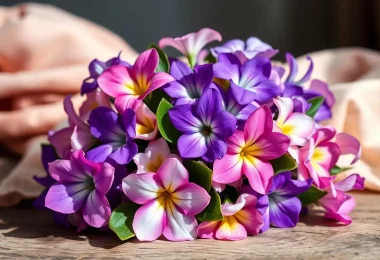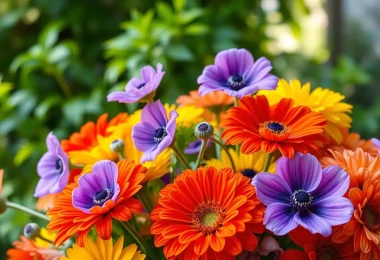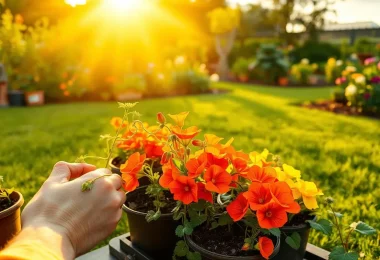Starting an herb garden is fun and rewarding. It gives you fresh herbs for cooking and a sense of pride. Growing herbs is simple and open to everyone, no matter their gardening skills. To start, you need to pick the right spot and choose the herbs you want.
With the right tools and knowledge, you can make a thriving herb garden. It will give you fresh herbs all year. This guide will help you create your own herb garden, whether for cooking or health.
Introduction to Herb Gardening
Growing your own herb garden is easy and beneficial. It lets you have fresh herbs anytime. Just follow a few simple steps to start your herb garden and enjoy its many benefits.
Key Takeaways
- Learn how to start an herb garden with easy-to-follow steps
- Discover the benefits of growing your own herb garden
- Get started with growing herbs, even with limited gardening experience
- Create a thriving herb garden that provides fresh herbs all year round
- Learn about the different types of herbs you can grow in your garden
- Understand the basics of herb gardening and how to get started
Benefits of Growing Your Own Herb Garden
Growing your own herb garden is a rewarding experience. It offers many benefits beyond cooking. You can enjoy the freshest ingredients, try new herb garden ideas, and explore different herb garden design styles.
Some key benefits of having your own herb garden include:
- Access to fresh, fragrant herbs all year, perfect for your favorite recipes and exploring the best herbs for herb garden cultivation.
- Cost savings over store-bought herbs, which can be pricey and often less potent than fresh herbs.
- Therapeutic benefits, such as reduced stress and improved mental well-being, from the calming and fulfilling act of gardening.
By diving into herb gardening, you unlock new culinary creativity. You also get a beautiful and fragrant garden that shows off your herb garden design style.
Choosing the Perfect Location for Your Herbs
Creating a thriving indoor herb garden starts with the right spot. Most herbs need lots of sunlight. So, a south-facing window or a spot with direct sunlight for 4-6 hours a day is best. This ensures your herbs get the light they need to grow well, making herb garden care simpler.
If direct sunlight isn’t possible, grow lights can help. They’re perfect for those without sunny windows. Also, ensure the area is well-ventilated to avoid fungal diseases.
When picking a spot for your herbs, remember:
- Adequate sunlight or grow lights
- Good air circulation and ventilation
- Proximity to a water source for easy herb garden care
By picking the right spot and following good herb garden care practices, you’ll grow a lush and fragrant indoor herb garden. It will give you fresh herbs all year.
Related te read: Growing Your Perfect Herb Garden at Home
Essential Tools and Supplies for Starting an Herb Garden
To start a organic herb garden, you need the right tools and supplies. Growing your own herbs can be fun and rewarding. With the right equipment, you’ll be on your way to enjoying your favorite herbs.
Basic tools include a garden fork, trowel, and pruners. They help you prepare the soil, plant herbs, and keep them healthy. You’ll also need good potting soil that drains well and is rich in organic matter. Choose containers that are at least 6-8 inches deep for your herbs’ roots.
You’ll also need watering equipment. A watering can or soaker hose makes watering easy. Here are more supplies you might find useful:
- Seed starting mix
- Fertilizer
- Mulch
- Supports for tall herbs
With the right tools and supplies, you can create a thriving herb garden. It will give you fresh herbs all season. Remember to follow herb garden tips like watering and pruning regularly for the best results.
Understanding Different Types of Herb Gardens
There are many ways to set up an herb garden, depending on the space you have. For tiny spots, a container garden is perfect. It lets you grow herbs even when space is tight. But, if you have more room, a raised bed garden is better. It offers better drainage and soil, great for a bigger herb garden.
For small areas, think about a vertical garden. You can use a trellis or a wall planter. This way, you can grow many herbs in a small space. You could also make a themed garden, like one for medicinal herbs or cooking. This makes your garden more fun and useful.
Some popular herb garden types are:
- Container gardens: great for small spaces
- Raised bed gardens: provide better drainage and soil quality
- Vertical gardens: perfect for making the most of a small space
- Themed gardens: add an extra layer of interest and functionality to your herb garden
When you start an herb garden, think about what your herbs need. Different herbs need different things like sunlight, water, and soil. By picking the right garden type, you can make a garden that grows well. This will give you fresh herbs all year, making growing herbs fun and rewarding.
Best Herbs for Beginners to Grow
Starting an herb garden is exciting. It’s key to pick easy-to-grow herbs that need little care. This boosts your confidence and gardening skills. A well-designed herb garden can be both beautiful and useful, giving you fresh herbs year-round. Mix culinary, medicinal, and aromatic herbs for a diverse and lively garden.
Some great herbs for beginners include:
- Basil, a classic culinary herb used in many Italian and Thai dishes
- Mint, a hardy and fragrant herb perfect for teas and cocktails
- Cilantro, a fast-growing herb commonly used in Mexican and Asian cuisine
Consider growing medicinal herbs like chamomile and calendula for their health benefits. Aromatic herbs like lavender and rosemary add beauty and a calming scent. These herbs make your garden unique and useful, offering a rich harvest.
Choose herbs that do well in your area’s climate and soil. Don’t hesitate to try different herb garden ideas. With practice and patience, you’ll soon enjoy fresh herbs from your garden.
Indoor vs Outdoor Herb Garden Considerations
Choosing where to put your herb garden is key. An indoor herb garden keeps herbs growing all year. It also protects them from pests and diseases. But, it needs more care, like making sure it gets enough light and water.
An outdoor herb garden gets natural sunlight and air. This helps herbs grow well and taste better. Yet, it might attract pests and weather can change suddenly. Think about your lifestyle and what herbs you want to grow to decide.
- Climate and weather conditions
- Available space and lighting
- Type of herbs you want to grow
- Level of maintenance and care you can provide
By thinking about these points, you can plan a great herb garden care routine. This will help your herb garden thrive, indoors or outdoors.
Soil Preparation and Planting Techniques
Creating a thriving organic herb garden starts with the soil. Choose a potting soil that drains well and is full of organic matter. Adding compost or fertilizer can make the soil even better for your herbs. This step is essential for a successful harvest.
A good soil mix is key for healthy plants. Here’s what to look for:
- Use a potting soil made for herb gardens
- Add compost or fertilizer for better soil
- Ensure the soil drains well to avoid waterlogged soil
After preparing your soil, it’s time to plant your herbs. Plant them at the same depth as in their pots. Space them based on their mature size to avoid overcrowding. Water them well after planting and keep the soil moist for a few weeks. These herb garden tips will help you grow a thriving organic herb garden.
Keep the soil moist but not too wet for healthy growth. With the right soil and planting, you’ll soon have fresh herbs from your organic herb garden.
Designing Your Perfect Herb Garden Layout
When planning your herb garden, think about how big each herb will grow. Make sure to leave enough space for each plant to grow well and breathe. This will make your garden both useful and pretty.
You can organize your herbs by theme, like cooking or medicine. This adds a neat touch to your garden.
A good herb garden design considers what each herb needs. For example, basil and mint need more water than others. Grouping these herbs together makes watering easier. Also, add things like garden ornaments or trellises to make your garden more fun.
Some great ideas for your herb garden include:
- Creating a themed garden, like an Italian or Mediterranean one
- Using containers or raised beds for depth and interest
- Adding companion plants to help your herbs grow better and keep pests away
By thinking about these points and adding your own ideas, you can make a beautiful and useful herb garden. It will make your outdoor space better and add joy to your cooking.
Essential Care and Maintenance Tips
Proper herb garden care is key for your herbs to thrive. Tasks like regular watering, pruning, and pest control are vital. These simple herb garden tips will help you enjoy a rich harvest and a beautiful garden.
First, create a watering schedule for your herbs. Too much water can cause root rot, while too little can stress them. Water when the top inch of soil feels dry.
Watering Schedule
- Water your herbs in the morning to allow the plants to absorb the water throughout the day
- Avoid getting water on the leaves to prevent fungal diseases
- Use a soaker hose or drip irrigation to deliver water directly to the roots
Pruning Methods
Pruning is crucial for herb garden care. It helps your herbs grow bushy and prevents them from becoming leggy. Use clean, sharp tools to avoid spreading diseases.
Pest Control
Watch out for pests like aphids and whiteflies. Use organic pest control to protect your herbs. Introduce beneficial insects, like ladybugs or lacewings, to control pests.
Common Challenges and Solutions in Herb Gardening
Growing an herb garden can face challenges like pests, diseases, and nutrient issues. To tackle these, ensure your herbs get enough sunlight, water, and nutrients. This will help prevent many common problems and keep your herb garden healthy and thriving.
Common pests in growing herbs include aphids, whiteflies, and spider mites. Use organic pest control like neem oil or insecticidal soap to fight them. Also, keep your garden clean by removing weeds and debris. Regular checks on your herbs can help you spot issues early, allowing quick action.
By following these tips and caring for your herbs, you can overcome common challenges. Stay alert and act fast if you notice any problems. With the right care and patience, you’ll have a thriving herb garden that gives you fresh herbs all season.
Some key takeaways for a successful herb garden include:
- Providing the right growing conditions, including sunlight, water, and nutrients
- Using organic pest control methods to prevent the spread of disease
- Regular monitoring of your herbs to catch problems early
- Keeping your garden well-maintained to prevent pests and diseases
Harvesting and Preserving Your Herbs
As your organic herb garden grows, knowing when to harvest is key. Most herbs are ready when they reach full size. Harvesting them often helps them grow more.
Timing is crucial when harvesting. Pick your herbs in the morning, after the dew but before it gets hot. This keeps their oils and flavors fresh. You can take leaves or stems, or cut back the whole plant to get new growth.
- Air drying: Tie herbs in small bunches and hang them upside down in a warm, dry place.
- Oven drying: Preheat your oven to its lowest temperature setting and place the herbs on a baking sheet.
- Dehydrating: Use a food dehydrator to dry herbs quickly and evenly.
After drying, store your herbs in a cool, dark spot. This way, you can enjoy your organic herb garden all year. And you’ll make the most of your herb garden tips.
Seasonal Care for Your Herb Garden
As the seasons change, your herb garden needs different care to stay healthy. Proper herb garden care helps with new growth and protects against harsh weather.
In spring, prune your herbs to encourage new growth and fertilize for healthy development. It’s also a good time to add new herb garden ideas and herbs like basil or mint. This keeps your garden fresh and diverse.
In summer, make sure your herbs get enough water and watch for pests and diseases. Harvesting your herbs often helps them grow back and prevents them from getting too long. Mulching and using neem oil are good herb garden care tips for summer.
In fall, harvest your herbs before the first frost and bring them inside to keep them warm. This is a good time to plan for next year’s herb garden ideas and prepare for the growing season. Adding a cold frame or greenhouse can help protect your herbs from harsh weather.
By following these seasonal care tips, your herb garden will thrive all year. Stay on top of herb garden care to ensure your herbs grow well. With some planning and care, you can enjoy fresh herbs all year.
Conclusion: Growing Success with Your Herb Garden
Congratulations on starting your own herb garden! You’ve learned a lot and are ready to grow fresh herbs. Remember, growing herbs is a journey of trying new things, being patient, and being creative.
Keep exploring and trying new herbs and growing methods. Adapt to your climate and what you like. This way, you’ll enjoy a big harvest and the joy of gardening.
Your herb garden will bring you joy and inspiration. It can make your cooking better, help with natural remedies, or just be a peaceful place. Trust your instincts and let your love for herbs lead you to a rewarding experience.
FAQ
What are the benefits of growing your own herb garden?
Growing your own herb garden offers many benefits. You get fresh herbs for cooking, saving money on store-bought ones. It also boosts your mood and mental health.
Fresh herbs make your food taste better. They add a fresh touch to your dishes. Plus, growing your own herbs can save you money over time.
Gardening is good for your mental health. It reduces stress and improves your overall well-being.
What are some essential tools and supplies needed to start an herb garden?
To start an herb garden, you need basic gardening tools. These include a garden fork, trowel, and pruners. You also need good potting soil that drains well and is rich in organic matter.
Choose containers that are at least 6-8 inches deep. This gives your herbs enough room to grow. You’ll also need watering equipment like a watering can or soaker hose for easy watering.
What are the best herbs for beginners to grow?
Beginners should start with easy-to-grow herbs. These include basil, mint, and cilantro for cooking. For health benefits, try chamomile and calendula.
Lavender and rosemary are great for their fragrance and beauty. They add a decorative touch to your garden.
What are the key considerations for an indoor vs. outdoor herb garden?
Indoor herb gardens offer year-round growing and protection from pests. But, they need more care and attention. Outdoor gardens get natural sunlight and better air but face more pests and diseases.
Think about your lifestyle and preferences when choosing between indoor and outdoor gardens.
How do I properly prepare the soil and plant my herbs?
Preparing the soil is key for a successful herb garden. Use a well-draining potting soil rich in organic matter. Add compost or fertilizer for better fertility.
Plant your herbs at the same depth as in their pots. Space them based on their mature size to avoid overcrowding. Water well after planting and keep the soil moist for the first few weeks.
What are some essential care and maintenance tips for an herb garden?
Proper care and maintenance are crucial for your herb garden’s health. Water regularly but avoid overwatering to prevent root rot. Prune your herbs to keep them bushy and prevent legginess.
Watch for pests like aphids and whiteflies. Use organic pest control methods to protect your herbs.
When and how should I harvest and preserve my herbs?
Most herbs are ready to harvest when they reach their mature size. Harvest them continuously to encourage new growth. You can dry herbs using air drying, oven drying, or dehydrating.
Store dried herbs in a cool, dark place. This helps preserve their flavor and aroma.









